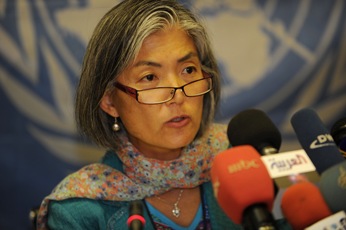Outlook for S. Sudan’s humanitarian situation remains “bleak”
December 4, 2014 (JUBA) – The United Nations assistance secretary general for humanitarian affairs, Kyung-Wha Kang, says the “bleak” humanitarian in South Sudan, still required more donor support.

“While the leaders of both sides continue to talk and negotiate peace, millions of South Sudanese are suffering,” she said.
Tens of thousands have been killed and more than 1.9 million displaced since the brutal conflict started in the country last year.
Over 100,000 people have sought refuge in UN bases across the country for fear of their lives or after being attacked from homes.
Millions more have reportedly fled into the bush and remain too fearful to return home as the violence conflict rages on to-date.
Kang, who also doubles as the UN deputy emergency relief coordinator, visited South Sudan from 19 to 21 November to assess the situation and the dire need of the people affected by the conflict.
“In Lankien in Jonglei state, I met a young boy of thirteen who had lost both parents in the fighting and fled with his five younger siblings,” said Kang.
“He is just one of half a million children who have lost education completely during the past year,” she added.
The top UN official also visited Gambella, the western part of Ethiopia, which currently hosts over 190,000 South Sudanese refugees, nearly 40% of the 472,000 who fled from conflict.
The rest of the refugees crossed into Kenya, Sudan and Uganda.
“In Gambella, I was impressed by the collaborative efforts of the Government of Ethiopia and humanitarian partners in helping South Sudanese, Eritrean and Somali refugees,” Kang told reporters.
Currently, Ethiopia reportedly hosts more than 600,000 refugees.
“This is the largest refugee population in Africa,” said Kang.
“Resources and services are becoming stretched and the scale is tremendous,” she added.
She further expressed concerns over the difficult in aid delivery in South Sudan, citing difficult conditions experienced by aid workers.
“Even before the current crisis, South Sudan was one of the most difficult environments in the world in which to deliver aid,” she said.
About 13 aid workers have reportedly been killed since December last year, although aid organisations have reached more than 3.5 million people with assistance this year.
“Aid organisations are urgently calling for US$600 million to kick-start next year’s operations,” Kang disclosed.
“As the dry season unfolds, relief workers need to pre-position life-saving and livelihood supplies, and repair key roads and airstrips,” she said.
“It is crucial to start this work now, before the rains start in April, when up to 60 per cent of the country’s roads become impassable,” she added.
Kang further called for an end to violations of human rights, including rape and sexual violence, murder and threats against humanitarian staff, the destruction of homes and livelihoods as well as recruitment of children.
“The first message from the humanitarian community is the violence must end. We must be given unfettered access to people in need, and the conflict must stop,” she said.
(ST)
